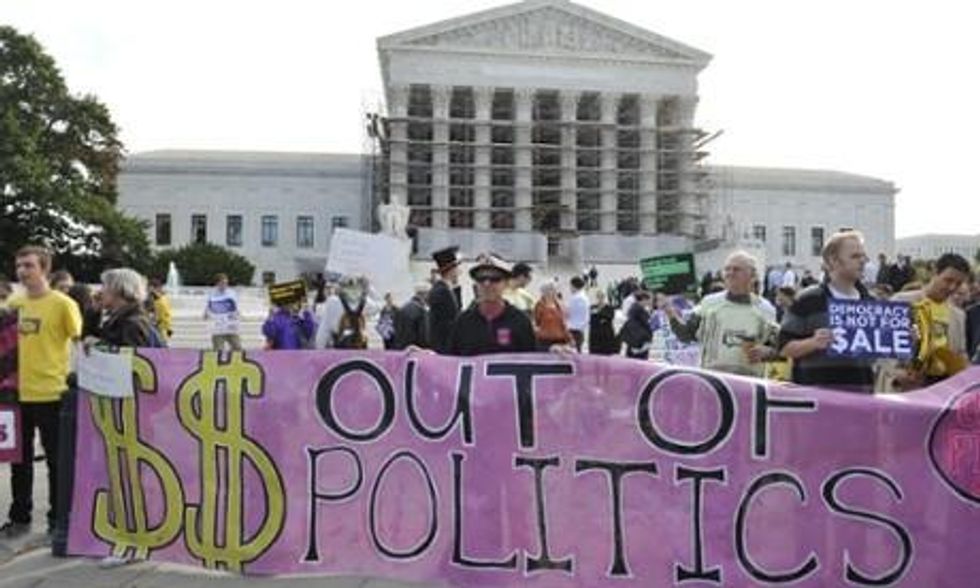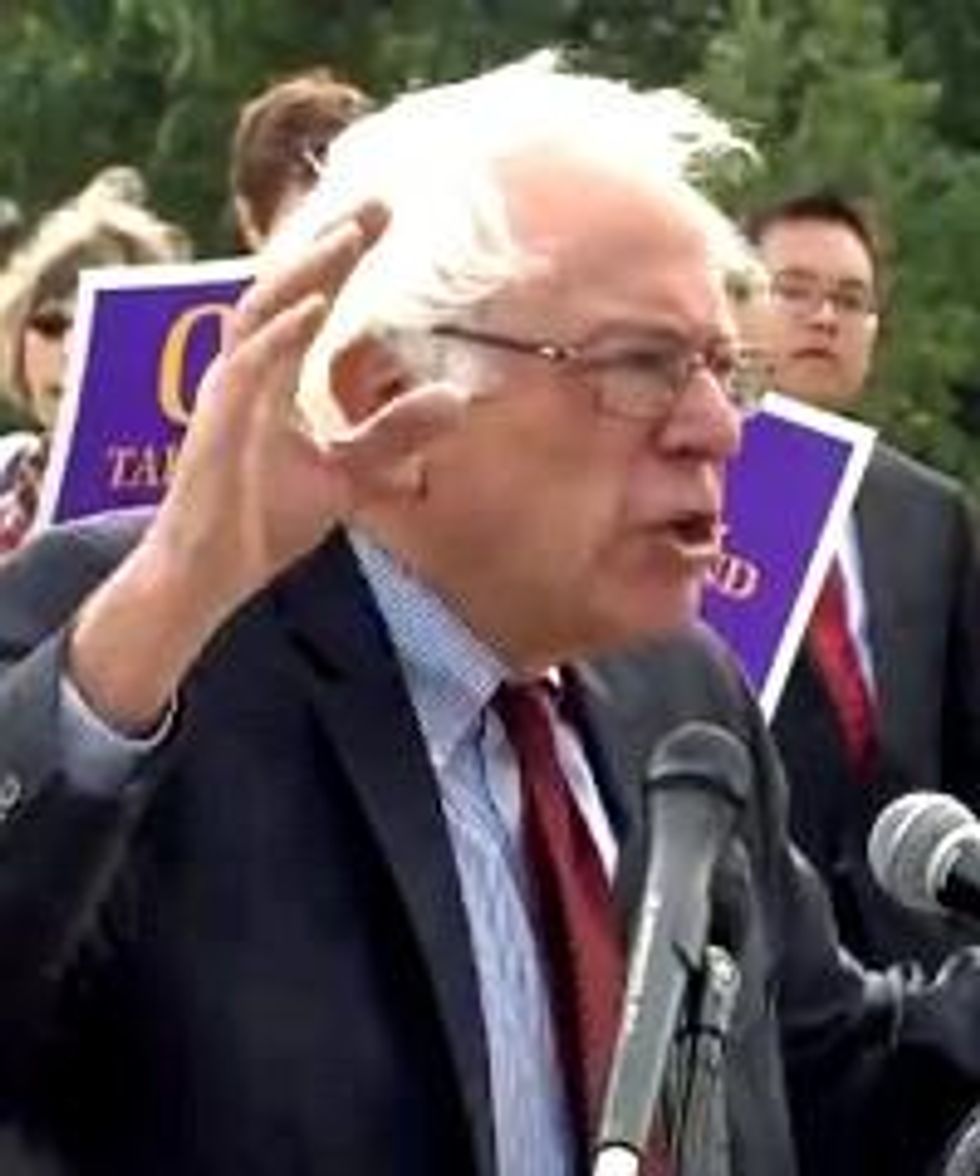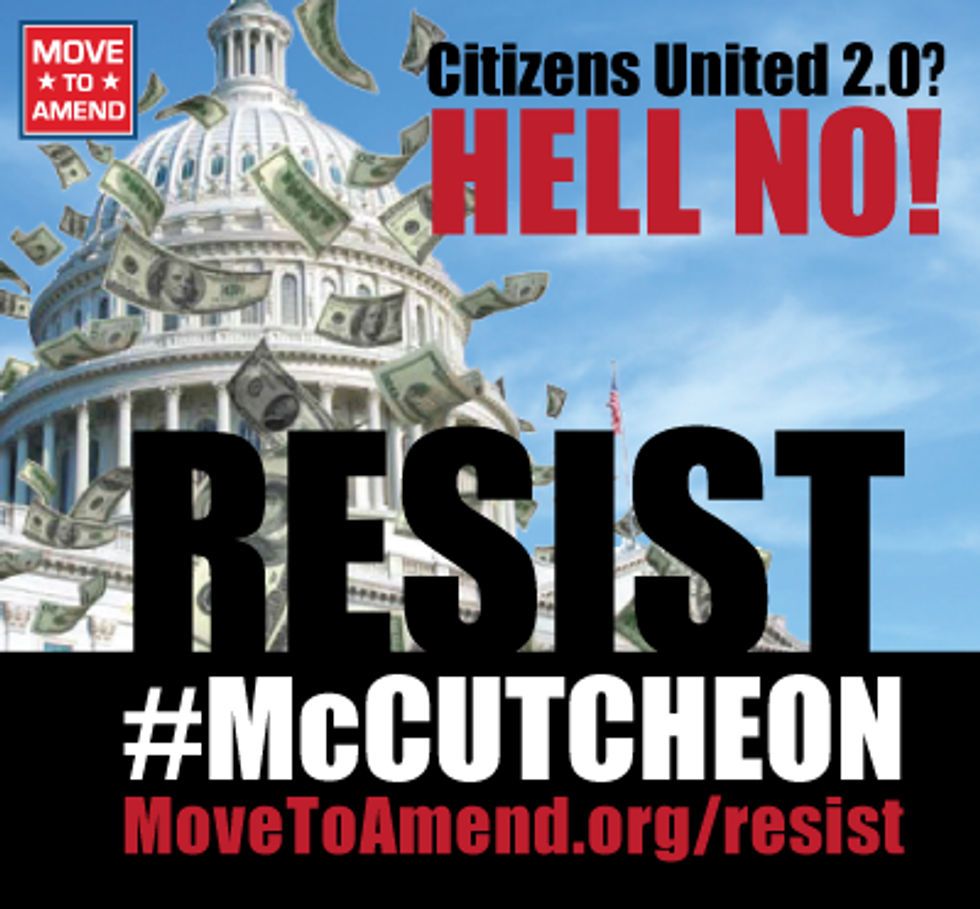

SUBSCRIBE TO OUR FREE NEWSLETTER
Daily news & progressive opinion—funded by the people, not the corporations—delivered straight to your inbox.
5
#000000
#FFFFFF
To donate by check, phone, or other method, see our More Ways to Give page.


Daily news & progressive opinion—funded by the people, not the corporations—delivered straight to your inbox.

In the olden days, buying votes was a risky business. That's not because the purchaser faced felony charges. No, the real peril was that the guy bribing voters wouldn't get what he wanted.
The process was too indirect. The man with "walking around money" would tell voters what he wanted them to do in exchange for a few beers or bucks. But Americans, being the contrarians they are, could cast their secret ballots for the exact opposite candidates, then accept the booze anyway, thank you very much.
These days, there's a much more direct process. One percenters and corporations can secretly buy politicians. Using front groups, the wealthy can "donate" unlimited millions to elect a candidate and remain completely anonymous. So the public won't know that the senator pushing for smiley faces to be printed on cigarette cartons instead of health warnings received $50 million in ads paid for by the tobacco industry.
Several news stories last week illustrated exactly how this threat to democracy, sanctioned by the gang of right-wingers on the Supreme Court in the Citizens United case, plays out. The most jaw-dropping is the case of former Republican Utah state attorney general John Swallow, who used shadowy nonprofit organizations to conceal hundreds of thousands of dollars in donations from the vilest industry in America - payday lenders.
In exchange for the money, Swallow promised to use the office of attorney general to champion payday lenders, the flim-flam men who exploit and bankrupt the poor with short-term loans at exorbitant interest rates.
Swallow made bald promises to this despised industry. In one letter to a Tennessee payday executive, he wrote, "I look forward to being in a position to help the industry as an AG [attorney general] following the 2012 elections." In another, he pledged to ward off regulation by the new federal Consumer Financial Protection Bureau by organizing a posse of other right-wing attorneys general.
Swallow knew, however, a payday lenders' water boy would disgust voters. So he and his associates shrouded the payday lender donations with a bunch of "social welfare" nonprofits, which don't have to report who contributes, the New York Times reported last week.
The scam disintegrated when the Internal Revenue Service began investigating one of the shady nonprofit groups that contributed to Swallow. Other inquiries followed, and Swallow resigned after less than a year in office.
Swallow's payday lender benefactors didn't lose their investment so quickly in another case, however. They bought ads vilifying Utah state representative Brad Daw, who had pushed for legislation that would have barred payday companies from loaning money to people already deeply in debt. After the payday lender-sponsored attacks, Brad Daw, a four-term lawmaker, lost his primary. Payday regulation defeated!
Payday lenders, justifiably, don't enjoy high public approval ratings. Yet, thanks to the right-wingers on the U.S. Supreme Court, they can circumvent democracy with boundless cash and get candidates elected or rejected.
What the right-wing justices ruled in the Citizens United case is that government can't limit the amount of money corporations spend to get a candidate elected, as long as they don't hand the money directly to the candidate.
New Jersey Gov. Chris Christie, the Republican of Bridge-Gate infamy, provides an example of how badly this sort of purchased politics plays out for citizens. In 2009, hedge fund manager Paul Singer donated $100,000, not to Christie, but to the Republican Governors Association. The Association, in turn, aired ads for then-candidate Christie.
At the time, The Nation magazine reported last week, Christie was blasting the Democratic gubernatorial incumbent for what Christie asserted was unethical investment of public employee retiree money on Wall Street, where risk and fees are higher and returns are lower than with traditional conservative investments such as U.S. Treasury notes.
Christie won and almost immediately after taking office began investing New Jersey public employee retiree money on Wall Street, with, of course, Paul Singer's hedge fund. A former trustee for another state retirement system estimated for The Nation magazine that Singer's fund collected $8.6 million in fees from the New Jersey investments - for one year, 2013. That year, Singer gave $1.2 million to the Republican Governors Association, which by then Christie chaired.
That's good for Christie, a potential presidential candidate, of course. The same can't be said for New Jersey workers and retirees. With an unusually large portion of the state retiree money in the hands of hedge funds by 2013, New Jersey's return, at 11.79 percent, was significantly lower than the median return on pensions that year of 16.1 percent.
The right-wingers on the Supreme Court are expected to rule any day in another case, McCutcheon, that would further empower the wealthy to buy the political process.
Right now, there's a limit on the aggregate amount a person or corporation can contribute directly to candidates during a two-year election cycle. The right-wing justices are expected to eliminate that cap.
It's $123,200. The average American doesn't make that much money in two years.
So, it's no wonder that politicians don't do what average Americans want. Significant majorities of average Americans think Congress should raise the minimum wage, extend unemployment insurance, lower income inequality and provide a path to citizenship for immigrants. But these are not the priorities of the 1 percent or of corporations. And, naturally, they are not the priorities of the politicians who owe their victories to buckets of cash from the 1 percent and corporations.
The rich can buy more of everything. More food. More cars. More houses. More vacations. More boats. But for a democracy to function properly, they should be forbidden from buying more votes.
Speaking outside the U.S. Supreme Court on Tuesday, Sen. Bernie Sanders (I-VT) warned that the nation's justices are preparing to cement the power of American oligarchs to influence elections through unlimited campaign donations.

Oral arguments on McCutcheon v. FEC began Tuesday with the court's conservative majority signaling a readiness to overturn regulations that set limits on how much an individual may donate to political parties and candidates themselves.
With such a ruling so soon after the court's decision in Citizens United v. FEC, which allowed corporations and unions to give unlimited sums to super PACs, a perfect money storm in the American political process may yet be on the horizon.
"Right now, as we speak, in the House of Representatives, there are people who are being threatened that if they vote for what we call a clean CR, to open the government without destroying the Affordable Care Act, then huge sums of money will be spent against them in the next election," Sanders said Tuesday, standing on the steps of the Supreme Court. "We are living in a society where a handful of people with incredible sums of money, folks like the Koch brothers and others, are undermining what this democracy is supposed to be about."
"The bottom line here is, if we don't want to move this nation to an oligarchic form of society, where a handful of billionaires can determine the outcome of these elections, then it is imperative that not only we overturn Citizens United, but that we put a lid on how much people can contribute to elections," he added. "Freedom of speech, in my view, does not mean the freedom to bribe the United States government."
Sanders was joined in spirit by President Barack Obama, who told reporters during a mid-afternoon press conference on Tuesday that he believes the Supreme Court's ruling in Citizens United contributed significantly to the Republican Party's decision to force a government shutdown. The president also warned that a similar ruling in McCutcheon could spell disaster.
"The latest case would go even further than Citizens United," he said. "It would essentially say anything goes. There are no rules in terms of how to finance campaigns. There aren't a lot of functioning democracies around the world that work this way where you can basically have millionaires and billionaires bankrolling whoever they want, however they want, in some cases undisclosed. What it means is ordinary Americans are shut out of the process."
This video is from YouTube, published Tuesday, Oct. 8, 2013:
McCutcheon vs. FECwww.youtube.com
If the Court strikes down contribution limits and further opens the big money floodgates, Americans will up the ante with acts of civil disobedience to show the Court and Congress that we are serious about passing an amendment to the U.S. Constitution
The Supreme Court of the United States is poised to continue dismantling restrictions on money in politics in a new case that begins today: McCutcheon v. Federal Election Commission.

The case bears remarkable similarity to the controversial Citizens United v. Federal Election Commission case of 2010, when the Court struck down decades of campaign finance law and re-affirmed their previous position that artificial entities (such as corporations and unions) should have Constitutional rights.
The response to this infamous case sparked a national movement on the part of the American public to propose a constitutional amendment prohibiting the concept of "corporate personhood" and the idea that spending money in elections is protected speech. If the Court takes the opportunity to further legalize bribery and corruption in McCutcheon, it could spark a national revolution.
As the four-year "anniversary" of the Citizens United case approaches, McCutcheon v. FEC challenges the aggregate limit on donations to federal candidates, political parties, and political action committees, which bars an individual donor from giving more than $123,200 in total during the 2014 election cycle.
An attorney for the Republican National Committee (RNC) filed the case, representing Alabama corporate businessman Shaun McCutcheon. During the 2011-2012 election cycle, McCutcheon contributed to sixteen federal candidates and tried to contribute to twelve others through the Conservative Action Fund, one of hundreds of "super PACs" allowed to accept unlimited funding from corporate treasuries. By existing law, McCutcheon was limited from donating more than $25,000 to each of three political committees established by the Republican Party.
The Court could still leave in place a $2,600 maximum on donations to a single candidate, but could allow a single donor to give that amount to limitless candidates and, more importantly, remove limits to political parties - who then spend money on behalf of candidates.
This course would require SCOTUS to revisit another landmark ruling. The 1976 Buckley v. Valeo case made the distinction between limits on direct contributions and campaign expenditures. The Buckley ruling established that direct contributions to political candidates and their parties can be restricted, but prohibits such restrictions on campaign expenditures made in support of a candidate or cause. Overturning this direct contribution restriction is the primary goal for the RNC, whose attorney, James Bopp (also the lead attorney in the Citizens United case), has publicly advocated for the stronger political parties it would create.
Worst-case scenario the Court could go even further. Although he is not a party in the case, the Supreme Court has granted time to Senate minority leader Mitch McConnell during today's oral argument to present his perspective: that all campaign contribution limits (pdf) are an unconstitutional burden on free speech and should be eliminated.
If the majority agrees this could take the "money is speech" Court-created doctrine to its extreme, and potentially set a precedent that could culminate in not only unlimited spending by individuals in federal elections, but also overturn state and local laws meant to level the playing field by limiting the amount that an individual, corporation, or other entity can contribute to political campaigns.
There is deep concern that a removal of the donation limits would allow officeholders and candidates to accept donations worth millions of dollars. Where Citizens United opened a floodgate for artificial entities to channel unlimited amounts of money to independent advocacy groups, McCutcheon could allow the people behind these artificial entities to contribute their personal fortunes directly to candidates or political parties as well.
The judgment in Citizens United has already given wealthy individuals and giant corporations the power to drown out the voices of ordinary people using nearly unlimited sums of money, protected as political "speech." If the high court continues its destruction of campaign finance restrictions with McCutcheon, corporate executives will have the power to flood our elections with their individual wealth. When this merges with the already overflowing river of money spent by their own corporations, the political voice of ordinary Americans will be swept away and with it policies that benefit the public interest.
This threat to our freedom of speech only underscores the urgency for a constitutional amendment that unequivocally states corporations are not people entitled to inherent Constitutional rights, and that money is not a form of protected political speech.
If the Court strikes down contribution limits and further opens the big money floodgates, Americans will up the ante with acts of civil disobedience to show the Court and Congress that we are serious about passing an amendment to the U.S. Constitution. Sign the "Resist to Amend Pledge."
Check out this video by Lee Camp explaining the McCutcheon case in simple terms:
Lee Camp's "Moment of Clarity" re: McCutcheon v. FECWhat if there were a secret poison you could give to politicians that would cause them to lose their elections? This poison would ...